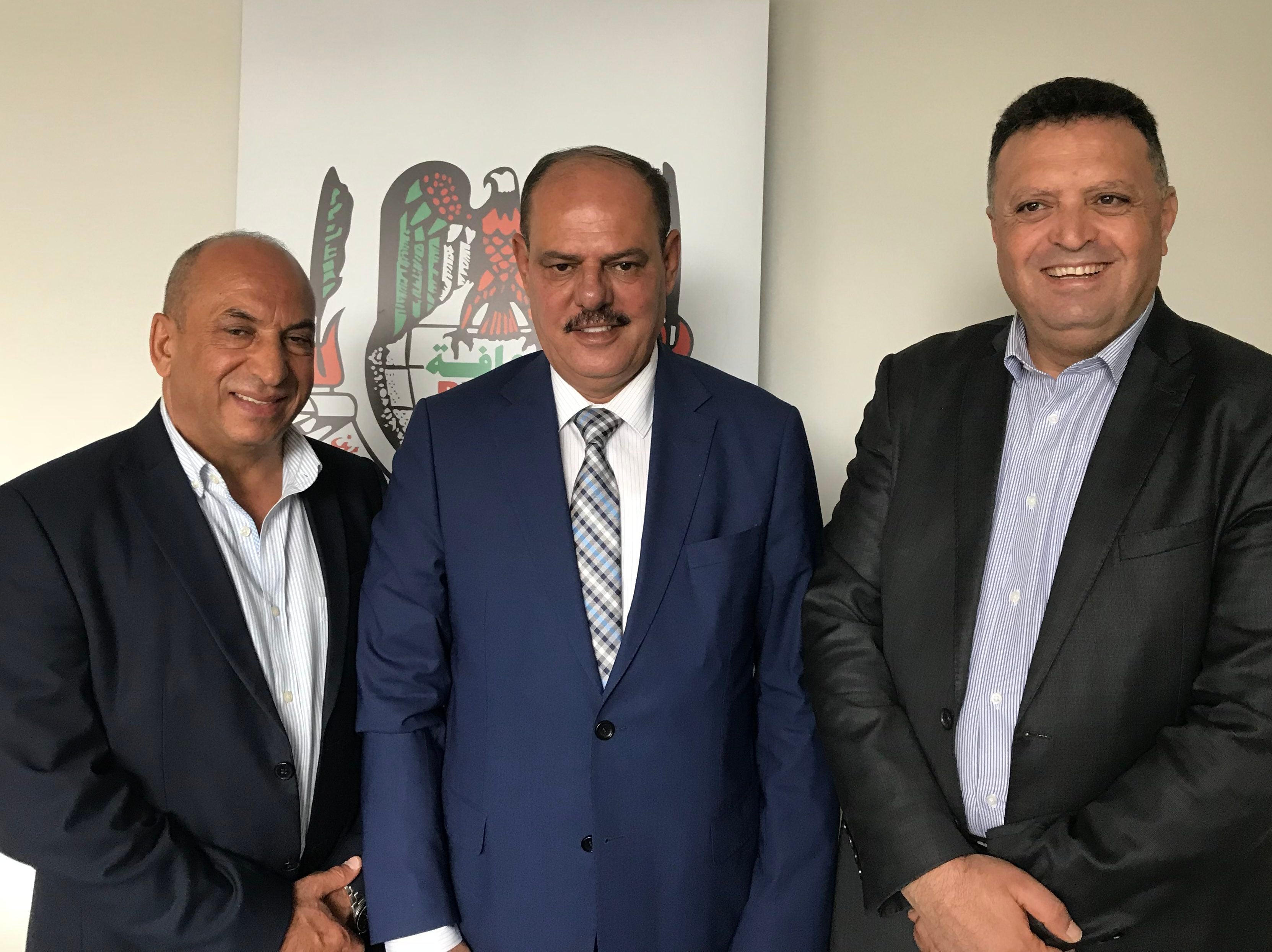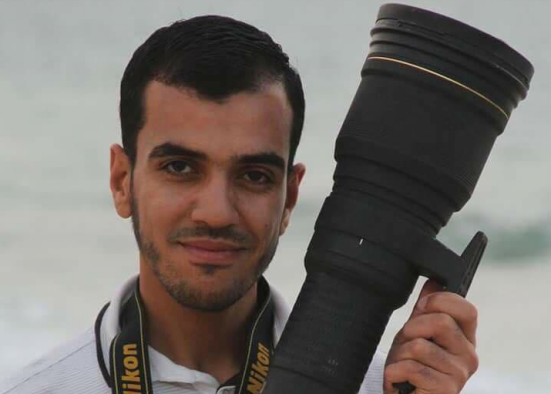
“During the time I’ve worked as a journalist I have been arrested, I have been beaten, I have been injured and targeted by rubber bullets,” says Musa Al-Shaer, board member of the Palestinian Journalism Syndicate and a frontline photographer.
“But that means I am lucky – it wasn’t live ammunition, it was only rubber bullets.”
Press Gazette spoke with Al-Shaer (pictured left) and other members of the PJS at an event organised by the National Union for Journalists where they described the situation journalists face whilst reporting in Palestine.
“I have been injured in my chest, my hands and my back two times,” continued Al-Shaer. “One was by a sound grenade during a protest against putting electronic gates around the Al-Aqsa mosque.
“Me and other journalists were among four that were injured at that time. Also I know many of my colleagues have also been beaten and attacked.”
The PJS is the Palestinian equivalent of the NUJ. During 2017,the group recorded 909 media violations in Gaza and the West Bank, including media closures, arrests and attacks. A 37 per cent rise on the year before.
Two Palestinian journalists have been killed in the field so far this year. Both men were shot while covering protests along the Israel-Palestine border despite apparently wearing flak jackets marked “PRESS”.
Yaser Murtaja, a Palestinian photo-journalist, was killed in March. Ahmad Abu Hussein was fatally wounded in April, according to Al Jazeera.

Yaser Murtaja, who was killed covering demonstration at the Gaza Strip on 6 April. Picture: Twitter
Despite the killings, Al-Shaer says that the violence has not deterred Palestinian journalists from doing their jobs.
“As Palestinian journalists we believe that we have a message and this message has to go to the international community and be delivered,” he said.
“Also it is our job, if you face a challenge in your job you have to change. These attacks and violations of press freedoms from the Israelis push us to continue and make us more determined to continue.”
He added: “There are a lot of people who are joining the profession as they believe it is part of our story under the occupation.”
The PSJ spoke at a public meeting in Parliament about the latest situation in Palestine on Wednesday last week.
Nasser Abu Baker (pictured right), president of the PJS, said: “We have come to London to collect support for our journalists and our syndicate from across the world and to explain our situation and suffering from the Israeli occupation to parliament and the media.
“There is no freedom of movement and from 2014 there have been 26 journalists killed [in Israel and Palestine] and more than 2,500 wounded.
“Across the media there have been closures [and] it has been forbidden for journalists to take pictures and film, so we are in a very bad situation.”
According to the Committee to Protect Journalists the number of journalists killed in Israel and Palestine is nine, but it said it only confirmed deaths when reasonably certain a journalist was killed in reprisal for their work.
Abu Baker added: “I’m very happy that this new generation [of journalists in the UK and worldwide] is following the situation in Palestine and we want to strengthen this relationship.
“I would be happy to invite the new generation and colleagues to come to Palestine and see the facts on the ground, to learn about the Palestinian situation and report the facts.”
Al-Shaer also encouraged members of the UK and global media and their colleagues to go to Palestine and “see the facts for themselves”.
He said: “We are here to see our friends and see the organisations which can stand up alongside the Palestinian journalists. We are working on a campaign to stop these attacks from Israeli soldiers on the Palestinian journalists and to have our freedom of movement.
“The West Bankers cannot come to Jerusalem and the Gazans cannot come to Jerusalem or the West Bank. Under some circumstances journalists cannot even move from city to city because of checkpoints and road-blocks.”
He added: “We are talking about ourselves as journalists, but this also reflects the situation of the people.”
Jim Boumelha of the International Federation for Journalists believes the current political situation facing Palestine has been exacerbated by US president Donald Trump’s decision to move the US embassy in Israel from Tel Aviv to Jerusalem.
Concerns are that Trump’s decision recognises Jerusalem as Israel’s capital, despite the fact that Palestine also claims the city as its capital and so undermines the US as a neutral broker in the as yet unsettled dispute.
Said Boumelha: “When Trump came to power and took the capital to Jerusalem, the Israeli forces became even more obtrusive and aggressive. The number of attacked journalists went up.”
According to the NUJ, 68 journalists have been injured in the region and 35 journalists have been detained since Trump’s Jerusalem declaration in December last year.
This spike in attacks in May was also linked to the March of Return, the border protests that marked 70 years since the Israeli declaration of independence and the mass displacement of Palestinians that followed.
Al-Shaer said: “During these years of my work I and my colleagues faced a lot of attacks – many of them were injured.
“At the beginning of this year two of them were killed by Israeli soldiers while they were covering the Great Return March in Gaza.
“Many tens were injured, the worst two of which were injured in the stomach and the leg and were unable to continue their work and were hospitalised for more than one month each.”
He added: “The Israelis were targeting journalists, especially the photographers because they have to go deep into the field in order to get their pictures. They are always in the view of the soldiers.
“We always wear our safety equipment, the press vest, the helmet, the tear gas mask, so we are well seen by the army but that doesn’t prevent them targeting us and shooting us.
“But still there have been many who have been injured and killed during the last three or four years.”
Michelle Stanistreet, general secretary of the NUJ said the PJS’s visit to London last wek was an “important part of helping to highlight the increasing violations against the press and against journalists”.
She said: “There’s a very clear and simple goal that we have, which is helping our Palestinian colleagues to be able to do their jobs, and do them freely and safely.
“We want an end to the attacks on media workers and on press freedom.
She added: “The determined effort of the Israeli state to silence journalists is why we must do all we can to provide ways for their voice to be heard and for these abuses to end.”
Moaiad Al Lamy (pictured centre), president of the Federation of Journalists of Iraq and president of the Federation of Arab Journalists, pointed to similar issues facing journalists in Iraq.
“Iraq has the highest number of journalists killed in the world following the American invasion of Iraq,” he said.
“So far [since 2003] 474 journalists have been killed [according to CPJ the total number stands at 277] and hundreds more have been injured.
“There have been two attempts to assassinate me and both resulted in serious injuries. The head of the union in Iraq before me was murdered.”
The PJS and the FAJ are hoping that by raising awareness of attacks on journalists, closures of media outlets and suppression of a free press, the situation in places like Palestine and Iraq can be solved.
Boumelha said: “At the moment the UN have got plenty of ammunition to protect journalists. Because of the dire situation for journalists they have passed very specific motions.
“The most recent one, resolution 2222, is very explicit on the protection of journalists but the UN doesn’t have the teeth to implement it.
“The key to solving it is the will of government.”
Email pged@pressgazette.co.uk to point out mistakes, provide story tips or send in a letter for publication on our "Letters Page" blog
